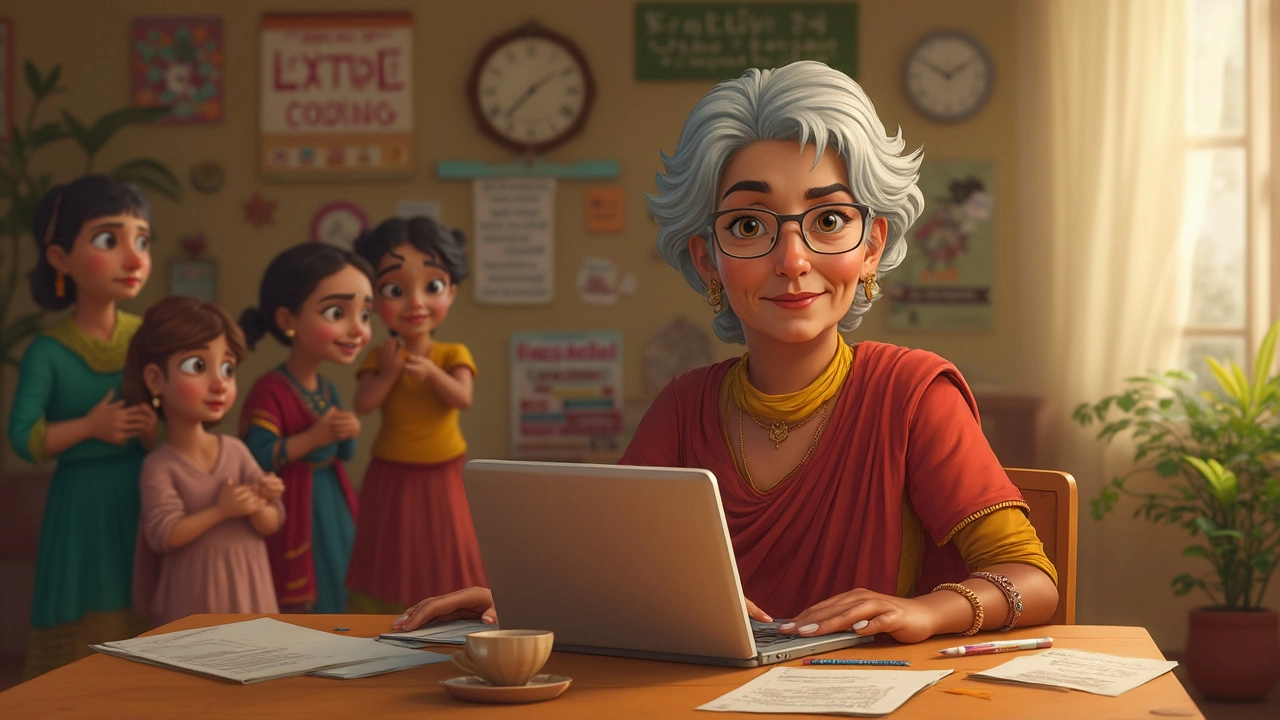Think learning to code is all about being young and glued to a screen? That’s just not true. Plenty of folks pick up programming in their 50s and later. In fact, people with life experience often bring better problem-solving skills than the so-called tech prodigies.
If you can use email or a smartphone, you already have a head start. What trips up beginners—even younger ones—usually isn’t age, but finding the right way to learn. The trick is to skip course options aimed at college kids and look for beginner-friendly classes that move at a reasonable pace. Interactive tutorials like those on freeCodeCamp or Codecademy don’t care how many candles were on your last birthday cake.
Worried about memory? That’s legit, but coding is all about practice—not memorizing giant manuals. The more you type and tinker, the more it sticks. Apps like Anki or simple online quizzes can help make stuff click if you need a nudge. Bottom line: age gives you patience, grit, and stories. Tech needs that just as much as fresh graduates.
- Breaking Down Age Myths in Coding
- What Really Matters When Starting Out
- Choosing Classes and Tools That Fit
- Finding Support and Staying Motivated
Breaking Down Age Myths in Coding
There’s this idea floating around that coding after 50 is impossible, or that programming jobs are only for twentysomethings. That’s just not backed up by facts. If you look at Stack Overflow’s 2023 Developer Survey, 7% of respondents were 45 or older. Plenty reported starting their tech journey in their 40s or 50s—some even later!
One big myth is that you’ll never catch up to younger coders. But coding doesn’t have a secret handshake only available to the young. In fact, many startup teams actively look for developers with project management or business backgrounds, which almost always comes with age.
Another common myth: "It’s too late to make a career switch into tech." Check out coding bootcamps like Flatiron School and General Assembly—they openly welcome folks over 50, and alumni outcome reports show adults getting placed in solid tech jobs after graduation. Your current job skills, whether it’s knowing how to manage a team, talk with customers, or solve daily work headaches, all translate to learn programming in your 50s better than you’d think.
Let’s clear up the “brain power” myth, too. Cognitive science shows adults can absolutely pick up new skills. The difference? Adults ask better questions, stick with tricky problems longer, and focus on real-world results rather than just chasing shiny new tech. One AARP article from 2022 featured a 59-year-old who started adult coding classes and built apps for her grandkids, no fancy computer background required.
Here’s a quick table busting some myths versus what’s actually true:
| Myth | Reality |
|---|---|
| You need to be young to code | People over 50 learn and code daily—whole forums exist just for them |
| Only young people get tech jobs | Tech companies value experience—some even prefer hiring career-switchers |
| Learning speed drops with age | With regular practice, skill grows at any age |
So, is being older a problem in coding? Not at all. It might even give you an edge no newbie grad can match.
What Really Matters When Starting Out
When you’re over 50 and thinking about learning to code, it’s not about being the fastest or knowing every cutting-edge language. The real kicker is consistency and picking the right path from the start. Jumping around between languages or courses doesn’t help anyone—especially not adults juggling life, work, and learning.
One key fact: research from the National Center for Women & Information Technology found older adults who learn coding are just as successful at landing tech jobs as younger folks, especially when they get hands-on support and work on real-world projects.
It might feel like everyone else started young, but according to Stack Overflow’s 2023 Developer Survey, 16% of people start learning to code after age 35. That number’s growing every year. Here’s the truth: persistence beats natural talent every time. Coding classrooms are no longer gated by age—bootcamps like General Assembly and Codecademy report rising demand among the 50+ crowd, and employers care more about your projects and attitude than your birth year.
"The best coders are the ones who keep showing up—age is just another variable, not a barrier." — Quincy Larson, founder of freeCodeCamp
So what really matters?
- Pick one language to start. Python is top for beginners because it’s used everywhere and is easy to read. Nobody ever got hired just for dabbling; focus matters.
- Set up a routine. Learning 30 minutes a day beats a big cram session every weekend. Your brain learns better when it gets regular reminders.
- Get hands-on right away. Don’t just watch videos—open up your code editor and try every example for yourself. Typing it out is part of the learning process.
- Stay social. Join online groups, attend meet-ups (even virtually), or find a coding buddy. Support helps you stick with it, and you’ll learn faster when you can bounce questions off others.
If you want some numbers, check this out:
| Resource | Reported 50+ Student Enrollment |
|---|---|
| freeCodeCamp | Over 12% in 2023 |
| General Assembly Bootcamp | Up 8% since 2021 |
| Codecademy | Roughly 10% in beginner tracks |
The most important thing isn’t age—it’s showing up, building small habits, and keeping at it. Tech jobs and communities need the diverse perspective that a career change over 50 actually brings to the table.

Choosing Classes and Tools That Fit
If you’re over 50 and thinking about learning to code, picking the right coding classes and tools is half the battle. Not every class is made for someone who brings decades of life experience. You want programs that respect your time and teach in plain English. That means avoiding anything that moves too fast, is loaded with jargon, or expects you to sit through three-hour videos without a break.
The best classes for beginners, especially adults, combine video, hands-on exercises, and some live support. Look for platforms like freeCodeCamp, Codecademy, and Coursera’s Python for Everybody series. These options offer flexible schedules and won’t leave you hanging with complex theory. Many adult learners swear by in-person coding bootcamps, too, because they double as a support group. Tech Elevator, Flatiron School, and General Assembly all welcome students in their 40s, 50s, and beyond. They even have job placement help for career changers.
Picking the right programming language matters. Python is a smart choice. It’s used everywhere, easy to read, and designed for people who want results fast. Stack Overflow’s 2023 developer survey showed that Python is the most popular language among newbies and second-career folks. You’ll also find tons of beginner-friendly tutorials around Python and JavaScript.
“Adults bring a different energy to tech—they want to solve real-world problems. We see great outcomes when courses focus on practical projects, not theory.”
– Quincy Larson, founder of freeCodeCamp
Let’s talk tools. Skip complicated setups and start with online playgrounds like Repl.it or Jupyter Notebooks, so you can code right in your browser. No installs, no messy configs. For staying organized, Notion and Trello help track progress. Zoom or Discord are great for joining live study groups and Q&As.
- Start with beginner courses that let you build fun, practical projects.
- Pick a language—Python is most newcomers’ favorite.
- Try out online editors to avoid tech hiccups.
- Lean into communities (online or local meetups) for help and encouragement.
Don’t get stuck thinking you need to understand everything at once. Step-by-step is the way to go. There’s a huge network of people—many over 50—walking the same path. With a bit of patience, you’ll notice progress faster than you might think.
Finding Support and Staying Motivated
Tackling coding after 50 might seem like a lonely road, but you don’t have to do it solo. One of the biggest game-changers is finding your tribe—the right support and some positive pressure from others can keep you rolling on days when code logic feels impossible.
Community matters. The adult coding classes scene has blown up, and some online forums like Stack Overflow and r/learnprogramming are packed with folks eager to answer questions, no matter your age. Meetup.com lists local coding groups; you might find in-person meetups or virtual hangouts just for beginners or specific age groups. According to a 2024 Codecademy survey, 19% of their U.S. users are over 45, showing you’re really not alone.
Getting a mentor helps too. Programs like CodeBuddies or even local library workshops can match you with someone to give feedback and keep you honest about progress. Don’t be shy about reaching out. Many experienced devs like sharing what they know, and swapping stories with people in the same boat can be a real confidence lift.
Coding is less about youth and more about persistence. We see older students learning faster because they know how to ask the right questions. — Sarah Drasner, Director of Engineering at Google
Setting small, personal goals can also crank up your motivation. Try things like:
- Finishing two new lessons each week on your chosen platform
- Solving a daily coding challenge (sites like LeetCode or Edabit are good for this)
- Building out a simple project every month—think a calculator app, a to-do list, or personal website
- Sharing what you’ve learned in a blog or social post (even if your audience is just a few friends!)
Tracking wins—no matter how tiny—keeps you going way longer than any big lecture ever could. Even printing a calendar and crossing off "study days" helps. If you start to burn out, remember to take breaks and connect with others. Coding’s a skill, not a race, and you bring way more to the table than you realize.

